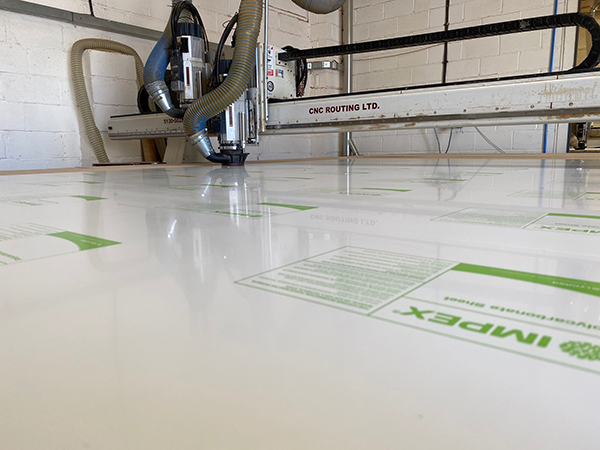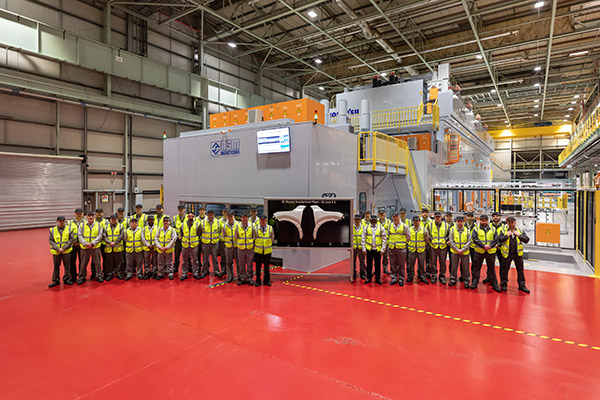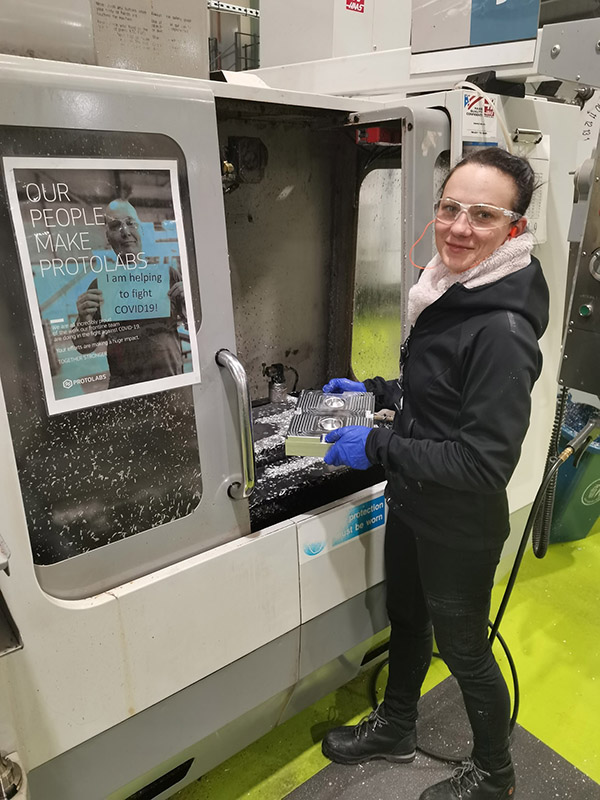Extraordinary times call for extraordinary suppliers and, luckily for Birmingham-based CNC Routing, the company has a long-standing relationship with Industrial Tooling Corporation (ITC). With the COVID-19 pandemic taking a firm grip on the nation, UK manufacturers like CNC Routing are stepping up to support the NHS and critical infrastructure projects.

Founded in 2005, the company has an established position serving the automotive, retail, healthcare and industrial sectors with its design, routing, finishing, fabrication, installation and building services. The company has three AXYZ routing machines, each having a twin-head facility. So, when a customer became overrun with the production of critical ‘sneeze screens’ for supermarkets, the 26-employee business immediately stepped-up to help the cause.
Discussing the sneeze screen project, head of design and technical at CNC Routing, Chris Noble, says: “Just a week ago we were commissioned to manufacture 8000 acrylic, PETG and polycarbonate sneeze screens for supermarket checkouts. Machined from 3050 x 2050 mm sheets, the screens are manufactured in two sizes of 600 mm wide by 750 mm high, and 750 mm wide by 1000 mm high, with panel thicknesses ranging from 3 to 6 mm. With the screens being supplied to more than a dozen supermarket chains, each with various till and checkout dimensions, the different sized screens require both hole position and dimensional variations. This has resulted in our company producing more than 12 different screen variants.”
As soon as the order arrived on the Friday, the company placed an order with ITC and tools were delivered the next morning (Saturday). Discussing why the company turned to cutting tools from ITC, Noble says: “We’ve been successfully working with ITC for over 12 years and they supply all the cutting tools for machining our plastic components. The service, support and technical advice is surpassed only by the quality of their tooling.

“The ability to supply 60 cutting tools on a Saturday morning as a next-day delivery service during the coronavirus pandemic speaks volumes for ITC and its service,” he adds. “But from a technical perspective, we were having problems some years ago with our cutting tools gripping parts and lifting thin sheets from the vacuum bed of the AXYZ machines during processing. ITC provided first-class technical support by investigating our existing tools, materials and cutting parameters, and subsequently supplying new tools and machining strategies that resolved our issues. Since then, we’ve had every confidence in ITC and their tools.”
Observing UK Government and WHO safe-working guidelines, CNC Routing has moved many of its office-based staff to homeworking, while the huge influx of work has also seen the company change from a two-shift to a three-shift pattern.
“As a business we are conscious of the health and safety of our staff, and all employees are provided with suitable PPE. By moving to 24-hour production with three shifts, our shop-floor staff levels are naturally reduced. Furthermore, each of our three AXYZ routing machines are 3 m apart, so our factory floor automatically exercises social distancing.”
From a production perspective, the company has one AXYZ router with bed dimensions of 4880 x 2635 mm, while two further machines have a slightly smaller bed. This allows CNC Routing to place four 8 x 4’ sheets on the machine bed at any one time.
“The large machine beds allow us to set up four parts at a time,” explains Noble. “Additionally, each router incorporates a twin cutting head, which we can set at different widths. For the sneeze screens, we have spaced the cutting heads at a distance of 1230 mm apart, so we can cut two sheets simultaneously. With three twin-spindle routers running 24 hours a day, the performance and reliability of the ITC solid-carbide routing tools is essential.”
Initially, CNC Routing placed an order for 60 Clearcut series single-flute routers (6 mm diameter) from ITC. Commenting upon the tools, Noble says: “From experience, we know that these tools perform really well, have exceptional tool life and, with the upward spiral flute geometry, are perfect for machining thin sheets without lifting from the vacuum bed. This confidence in the 180 Clearcut series has been confirmed, as we’ve run the tools at 24,000 rpm up to the full 6 mm depth of cut at cutting speeds of 7 m/min. These machining parameters are beyond the recommended cutting conditions, but extraordinary times call for extraordinary measures. Luckily, the quality of the ITC Clearcut series can handle the increased speeds and feeds with ease.

“Despite running at significantly increased machining parameters, the 6 mm diameter cutters can comfortably process more than 50 sheets before we have to change the tool,” he continues. “After 50 sheets, the cutting performance and edge finishes are as good as they are on the very first sheet that we cut with a new tool. The only reason we change the tools after machining 50 sheets is because the protective film over the acrylic, PETG and polycarbonate sneeze screen sheets begins to fray slightly and ‘fluff up’.”
Nobody has a crystal ball, especially during a pandemic that is likely to change the face of UK manufacturing. However, CNC Routing is in a somewhat envious position compared with most manufacturers. The company has already manufactured 8000 sneeze screens in a week and has another 8000 to produce imminently.
Says Noble: “We are currently in the process of machining sneeze screens for supermarkets and, as the longevity of this situation continues and ‘non-essential’ retail companies re-open their doors for business, we expect to be making these sheets for everything from pharmacies and hardware stores to pet stores and other retail outlets. Added to this, we also have a strong order book with the healthcare sector for furniture, storage units and lockers that has to be fulfilled imminently. As a business, we’re very lucky that we can give all of our routing capacity to these essential services. We can do this as our regular retail work is naturally ‘on pause’. However, regardless of whether we are making sneeze screens, furniture or storage units for the health service, we know that we can rely on specialist cutting tools from ITC, even during a crisis.”
For further information www.itc-ltd.co.uk























